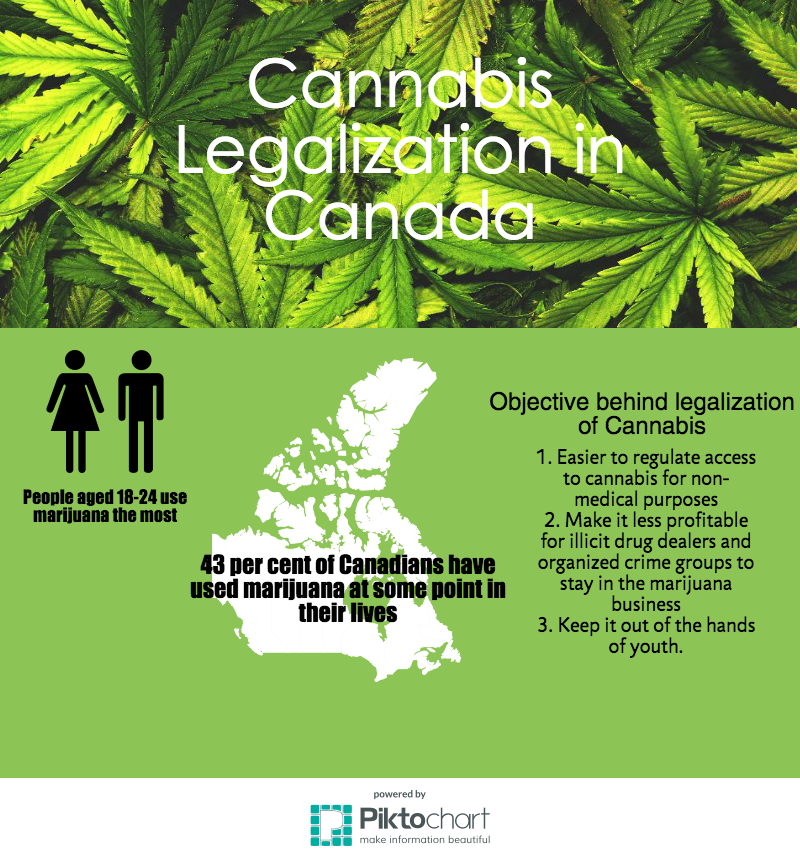Some Loyalist students in favour of marijuana legalization
By Lindsey Cooke and Cali Doran
BELLEVILLE – Some Loyalist College students are in favour of the upcoming legalization of marijuana happening in July 2018.
“I honestly think that the legalization of marijuana has been a long time coming. I know for a fact the legalization will benefit a lot more people. The fact that they are going to stop sending people to jail for multiple years for a single plant, the fact that, that kind of system is going to finally stop is going to be very beneficial for a lot of people,” said photojournalism student Monica Stefanick.
Electrical engineering technician student Dan Sachett agrees with Stefanick. “In comparison to alcohol and other governmental-regulated drugs, weed is the best possible alternative, if gone about correctly,” said Sachett.
QNet News spoke with Craig Jones the executive director for the National Organization for the Reform of Marijuana Laws, who spoke strongly about the organizations beliefs around the substance.
“Our attitude is that the criminal justice system is not the appropriate tool to regulate consumption of something like cannabis that people consume consensually,” shared Jones.
The NORML has been around since the mid 1970s and their mission has been to change the laws around cannabis use.
Jones believes that once Canada legalizes and regulates marijuana, there can be campaigns informing the harms of cannabis use.
He said that there has been a mistake with alcohol and tobacco but it’s not too late for marijuana.
“It might be too late to undo the harm of alcohol and tobacco industries because they are so powerful and profitable but its not too late to do serious informed evidence driven public education around cannabis, and that’s what we should get on right away.”
The Canadian government tabled the marijuana legislation Thursday morning, according to CBC News.
New law aimed to take effect ‘no later than’ July 1, 2018. More resources coming for Health Canada, RCMP, Border Services and Public Safety.
— CBC News Alerts (@CBCAlerts) April 13, 2017
They discussed restrictions about how the product will be marketed and sold. The government is planning on using roadside salvia tests to see if drivers are under the influence.
The parliament meeting also spoke about how it could be legal to carry up to 30 grams, which to some Loyalist students seems excessive.
“I don’t see why anyone needs to walking around with more than 30 grams really,” said television and new media student Tavis Cummings.
“Is there a limit on the amount of alcohol you can buy? Is there a limit on the amount of tobacco you can purchase? And yet those two drugs are more dangerous than cannabis,” said Jones.
Another reason for reassuring the legalization of marijuana is to “create an enforceable gate between the consumer and the black market,” he said.
There have been articles in the past that label cannabis as a gateway drug to harder substances, according to an article published in the New York Times.
Jones said that there is no evidence suggesting cannabis is a gateway drug.

(Left to right) Monica Stefanick and Cassie Gibbons
Stefanick admitted to celebrating her fifth year sober from hard drugs because she started smoking marijuana. Her friend and classmate Cassie Gibbons also shared her story. “I’m about a year and a half off of prescription painkillers because I started smoking marijuana,” she said.
Jones had made a presentation to the Canadian government’s legal marijuana task force when they were touring the country. He mentioned that some of the language he used was seen in the government’s report.
“If the legislation from the government follows along the lines of the task force report, the government will have gotten the big issues essentially correct. That does not mean there will not be a lot of learning to do in the next five to ten years,” he explained.
The legalization of marijuana is said to happen no later than July 1, 2018.

 Print This Post
Print This Post






